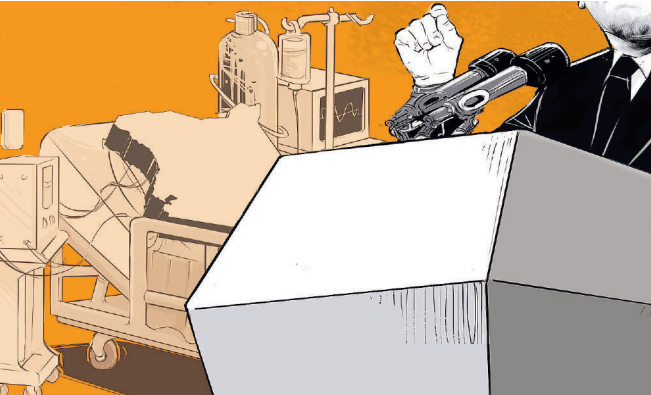

In Rwanda, the Minister of Health is a physician-scientist with a PhD in Epidemiology.
In Namibia, the newly appointed minister is a young doctor with experience in pandemic response, digital health, and community advocacy.
In Kenya, our new Health Minister is a seasoned politician. And somehow, we expect better results.
Kenya is not failing because it lacks doctors, hospitals, or funding. It is failing because we continue to appoint the wrong people to lead its health sector.
The crisis is not just medical- it is moral, managerial, and profoundly political.
Let's call it what it is: a leadership failure masquerading as a system collapse.
Consider this: Kenya's maternal mortality rate stands at 530 deaths per 100,000 live births. That's over twice as high as Namibia's (195) or Rwanda's (203)-countries with far smaller economies. This is just one example of where our countries differ in health outcomes.
These aren't just numbers to me. As a surgeon, I've spoken to the patients who survived and mourned with families who didn't. Each death is a tragedy. And each one, a reminder that policies are not abstract-they're lived, suffered, and sometimes buried.
And still, we keep playing musical chairs with health leadership. Appointments are made for political balance, not public health outcomes.
Even when competent individuals are brought in, it's rarely because of their reform record- it's because they're politically convenient.
Meanwhile, healthcare workers carry the weight. I've seen their exhaustion in hospital corridors, their frustration in endless meetings, their silent heartbreak when systems fail patients they tried desperately to save. But resilience has its limits. You can't keep pouring from an empty cup.
Rwanda's Dr Sabin Nsanzimana lectures, researches and builds systems. Namibia's Dr Esperance Luvindao brings energy, innovation, and frontline experience. Kenya's health sector deserves leaders like that. Our patients deserve it. And so do the thousands of health workers still showing up despite being overlooked.
Instead, our new minister’s first statement was about shutting down more health facilities and that government critics are spewing propaganda.
Leadership in health isn't about knowing how to run a campaign. It's about knowing what it takes to keep a child alive. It's about understanding the pain behind the statistics. It's about knowing, as I've come to learn in the operating room, that even small delays and poor decisions can cost everything.
We do not lack money. We lack the courage to stop treating healthcare as a place to reward allies and start treating it as the beating heart of national survival.
What would better leadership look like? It would mean appointing people based on their experience in health systems, not in political survival.
It would mean building a professional leadership pipeline within the sector-one that includes clinicians, researchers, data experts, and administrators with actual track records of impact. It would mean putting patients, not politics, at the centre of decision-making.
Our next great health reform won't come from a new building or a new boardroom. It will come from the courage to appoint people who belong in those roles. Not just politically-but professionally, ethically, and emotionally.
Until we stop mistaking proximity to power for qualification, we will remain stuck in this cruel loop: hope, hype, collapse. We don't need a miracle. We just need leaders who know the difference between a stethoscope and a slogan.
Dr Nicholas Okumu is an orthopedic surgeon, healthcare strategist, and global surgery advocate based in Nairobi.

















